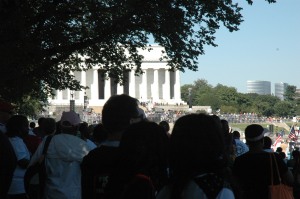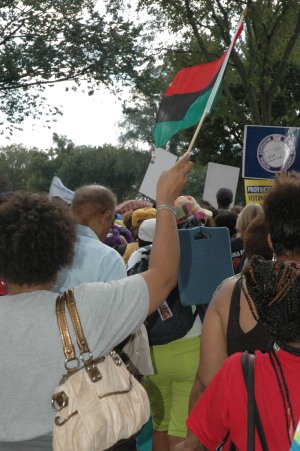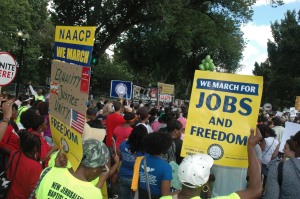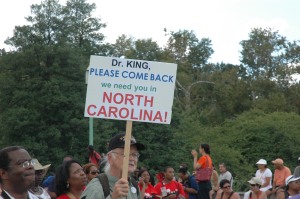Dr. Kerry Taylor, Citadel: The Military College of South Carolina
Assistant Professor of History and Director of the Citadel Oral History Program
Will Jones’s new book, The March on Washington: Jobs, Freedom, and the Forgotten History of Civil Rights, has been on my mind these past few weeks as friends in Charleston worked to commemorate the March’s 50th Anniversary. Jones argues that the more radical dimensions of the historic March — its economic agenda and the leadership provided by black socialists and trade unionists — have been mostly forgotten over time. A. Philip Randolph, leader of the Brotherhood of Sleeping Car Porters, initially pitched the idea for the 1963 demonstration as a “March for Jobs” to call attention to “the economic subordination of the Negro,” as his associate Bayard Rustin put it. Modeled on their campaign to desegregate war industries in the 1940s, Randolph and Rustin called for an end to employment discrimination, a federal jobs program, and a minimum wage hike. Jones asserts that it was among “the most successful mobilizations ever created by the American left.” He also suggests that the March may have represented the largest gathering of union members in US history and observes that the demonstrators were mostly low wage African American workers. Malcolm X, nevertheless, dubbed it the “farce on Washington.” Later, New Leftists and advocates of Black Power were similarly dismissive. They alleged that the March was compromised by concessions to the Kennedy administration and white liberals. Jones rejects those allegations, but notes that our memories of the March have reduced it to a civil rights event and the backdrop for Martin Luther King Jr.’s “I Have a Dream” speech.
Last Friday evening (August 23), more than 150 area residents boarded three chartered buses, rode ten hours to Washington, and took part in the anniversary March. Black workers — most notably members of the International Longshoremen’s Association Local 1422 and African American employees of the Medical University of South Carolina –organized the trip. They viewed the commemorative events in Washington as an opportunity for movement building — a chance to energize local struggles and to network with activists from around the country. The Greater Charleston Central Labor Council provided additional funds, as did a handful of businesses and churches, the North Charleston branch of the NAACP, and a few generous individuals. The Charleston contingent mirrored Will Jones’s description of the crowd in 1963. They were nearly all African American, and included public employees, childcare specialists, longshore workers, the unemployed, and retirees. They were joined by a few professionals. The cost of the trip was $20, but no one was denied a seat on the bus for lack of funds.
Some observers of the 50th Anniversary March have echoed the earlier criticisms of the 1963 March. Dave Zirin, writing in The Nation, asserted that “far too many speakers pay homage to the narrowest possible liberal agenda in broad abstractions with none of the searing material truths that make Dr. King’s speeches so bracing even today.” On his way to the Metro following the March, Bob Zellner, a former field secretary for the Student Nonviolent Coordinating Committee, complained to me that March organizers relegated the Rev. William Barber of the North Carolina NAACP to a one minute, early morning prayer. Barber has been the public face of the Moral Monday protests against the General Assembly’s health and education cuts and attacks on voting and labor rights. The weekly demonstrations, which began in April, have been sustained by a robust coalition of church, labor, and community groups and have resulted in nearly one thousand arrests for acts of non-violent civil disobedience. Zellner recently relocated to Eastern North Carolina from New York to be a part of the movement and had been lobbying the March planners to give Barber a prominent speaking slot.
I’m sympathetic to these critiques. A commemorative event built around the Moral Monday protests and the Dream Defenders, who recently ended their month-long occupation of the Florida governor’s office in protest of the state’s stand your ground law, would have made for a worthy tribute to the 1963 March. I would have preferred to hear more about the struggle to save public education in Chicago than a pep talk from Nancy Pelosi or Eric Holder. The nation needs more Asean Johnson, the nine-year old Chicago student who spoke movingly, but very briefly about the need for school funding equity, and less Al Sharpton, who we can dial in any night of the week. An event more focused on North Carolina, Florida, and Chicago could have put the national spotlight on these local movements. It would also have projected to the public a clear sense of what a 21st-century mass movement for human rights looks like.
If the March planners attempted to dull the message or to constrain grassroots energy, however, they were limited in their effectiveness. The historical power of the black freedom movement as well as the experience of marching on Saturday with fellow travelers from Cleveland, Syracuse, and Atlanta bested all efforts to control the March on Washington. That became clear to me during the two-hour late-night discussion that took place on the bus ride back to Charleston Saturday night. Longshoreman Leonard Riley facilitated a program evaluation and organizing seminar during which bus passengers declared that participating in the March had been among the most moving experiences of their lives. They explained that they had brought children along in order to expose them to the tradition of struggle that they inherit. And in sometimes brutally honest language, participants engaged in deep self-criticism of the Charleston movement, reflecting on weaknesses of the past and identifying the challenges ahead.
Recommended Resources:
William Jones in Dissent
http://www.dissentmagazine.org/article/the-forgotten-radical-history-of-the-march-on-washington
William P. Jones, The March on Washington: Jobs, Freedom and the Forgotten History of Civil Rights (W.W. Norton & Co, 2013)
Asean Johnson, Chicago student, March on Washington
Phillip Agnew, Dream Defenders, March on Washington
Kerry Taylor teaches US history at The Citadel and coedited volumes four and five of The Papers of Martin Luther King, Jr.
Additional images by Herb Frazier of the 50th Anniversary of the March on Washington, August 2013:
Filed under: Jubilee Project ![]()






